How to Create Viral Content: Proven Strategies to Boost Engagement
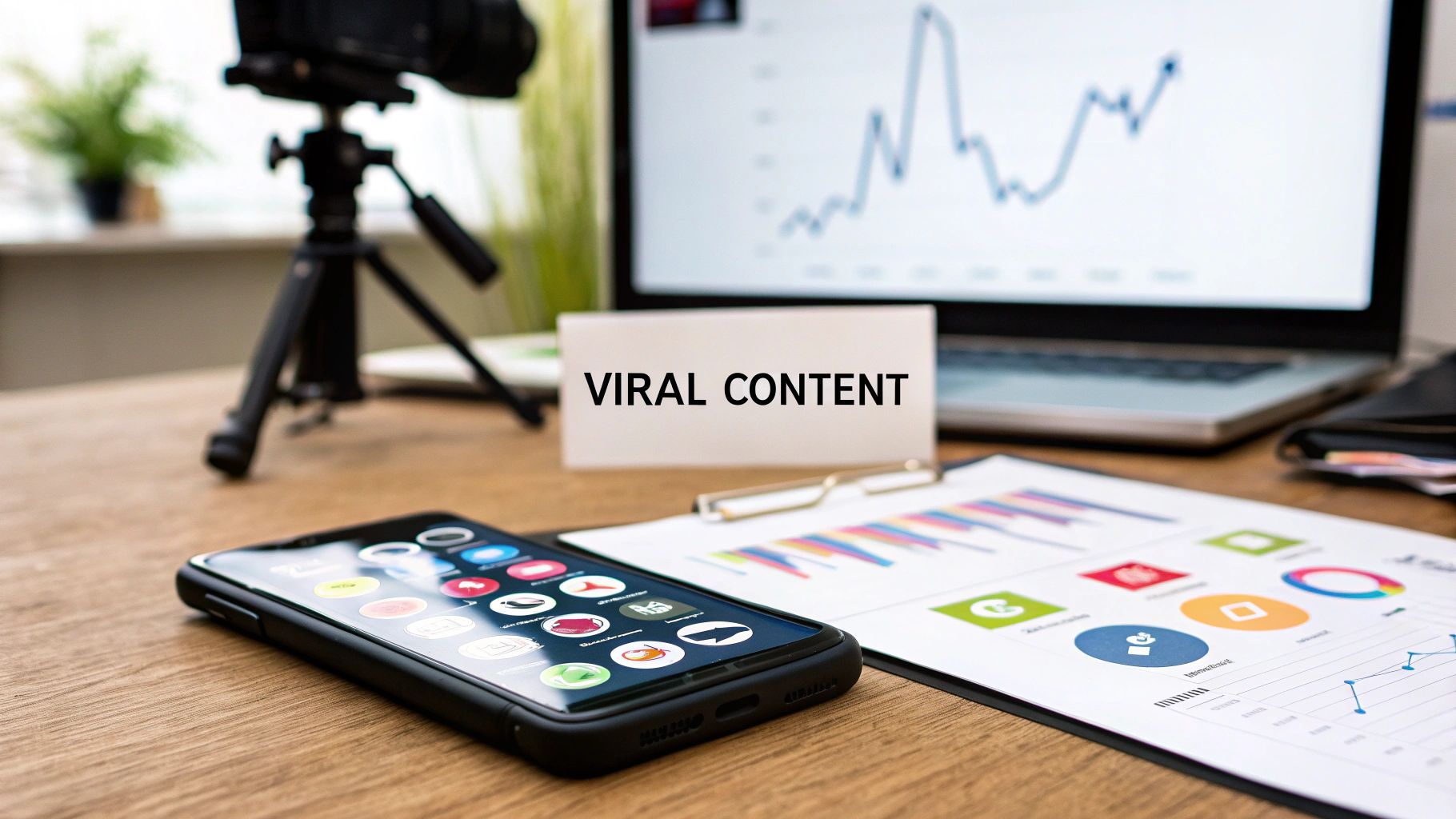


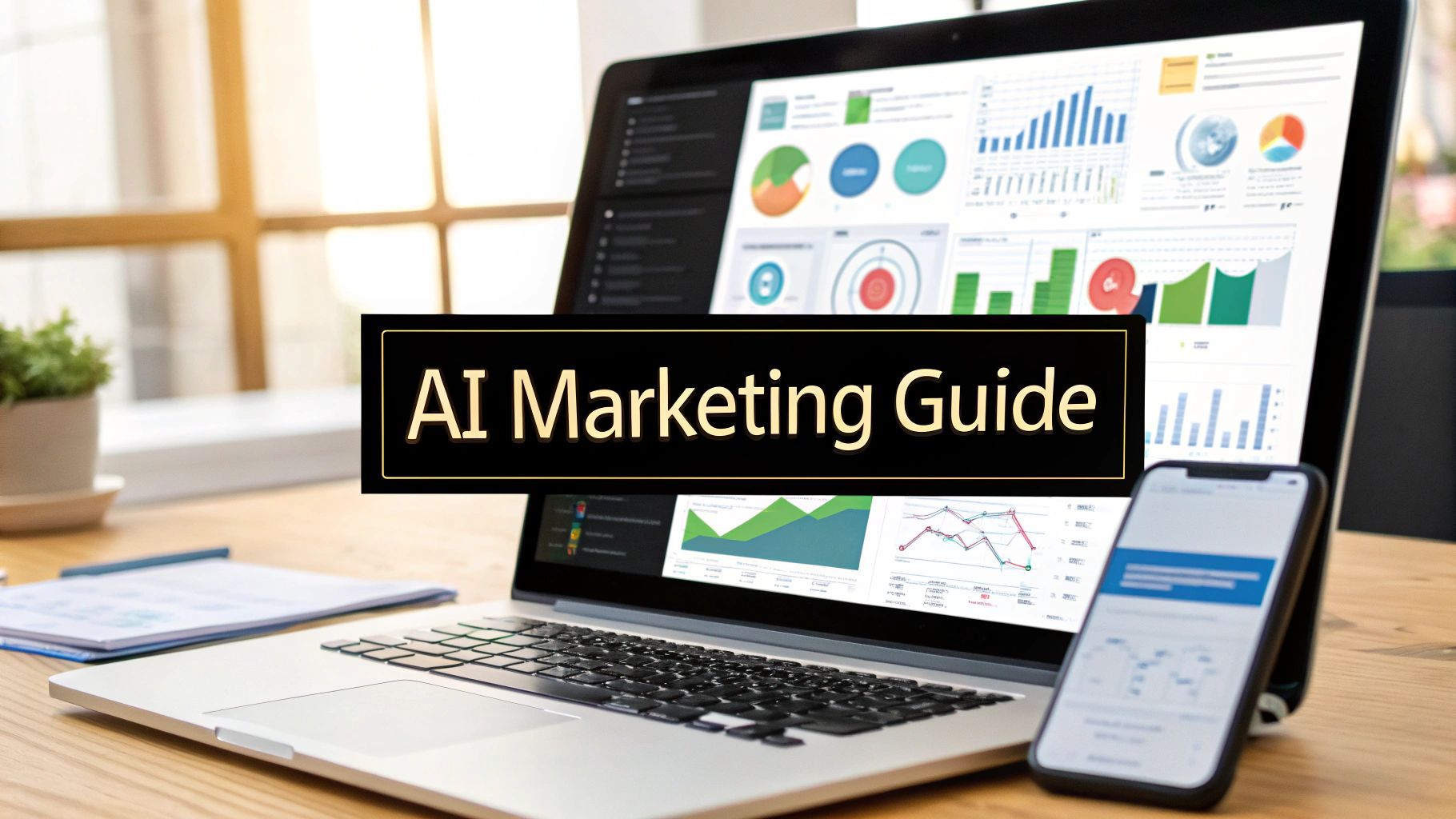
Learn what is artificial intelligence in marketing. Discover how AI works, its benefits, and real-world examples that drive modern marketing strategies.
Ever wonder how Netflix just knows what you want to watch next? That’s not a lucky guess or some marketing wizardry—it’s AI in action. Think of artificial intelligence in marketing as having a brilliant, data-obsessed co-pilot for your entire team. It’s a system designed to sift through mountains of customer data to spot patterns and predict what people will do next, all at a scale humans simply can't match.
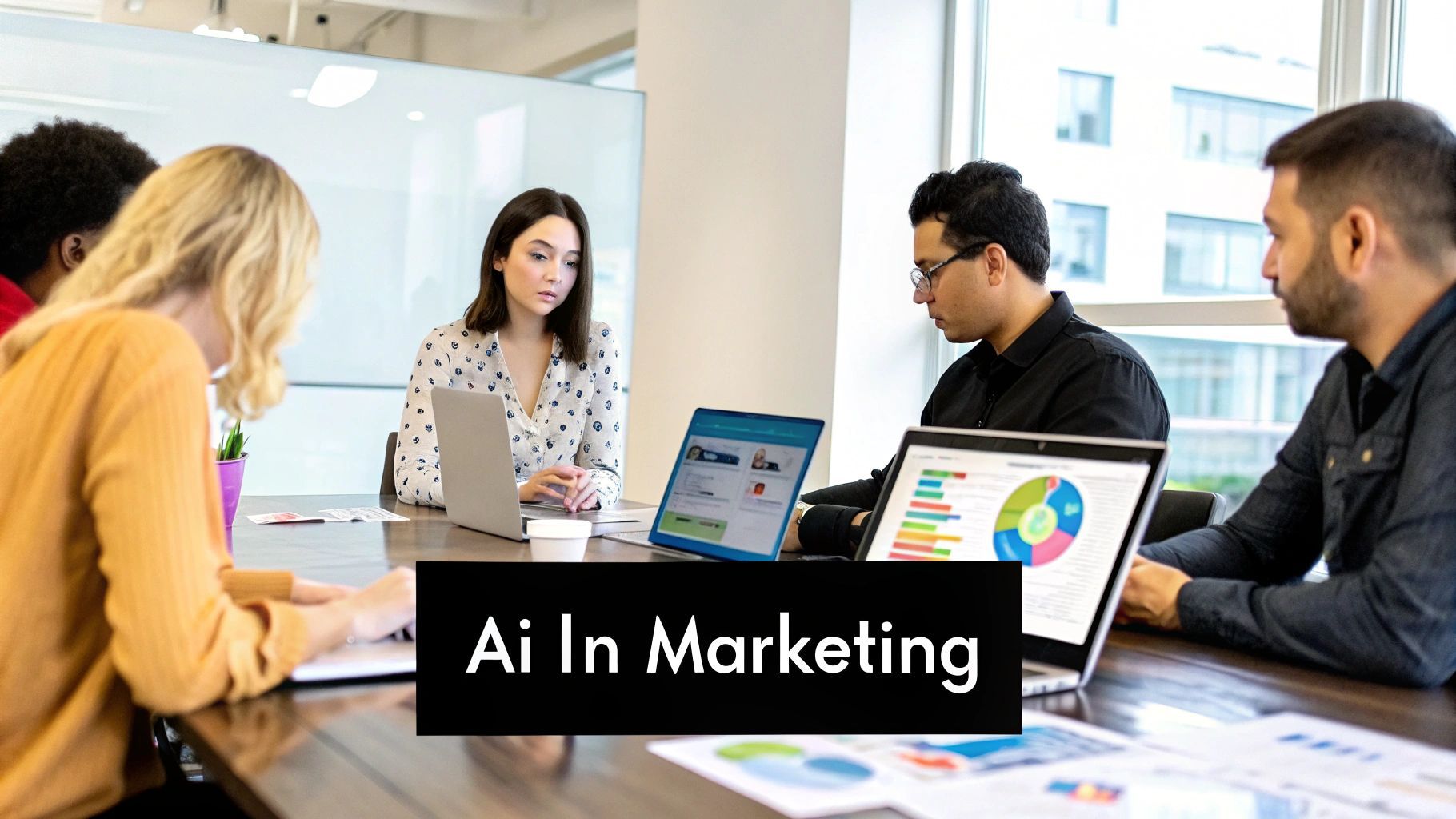
At its heart, AI in marketing is all about using smart computer systems to do things that typically require a human brain. It's the engine running under the hood of everything from your personalized Amazon recommendations to the helpful chatbots that answer your questions at 2 AM. It's not just one thing; it's a whole toolbox of technologies that learn from data, adapt on the fly, and take action.
This isn't some far-off future concept, either. It’s become a cornerstone of modern marketing strategy. A recent survey revealed that around 88% of marketers already use AI tools in their day-to-day work. The most common use? Content optimization, which about 51% of teams rely on. You can dig into more of these fascinating figures in these AI marketing statistics from SurveyMonkey.
The goal is brutally simple: make smarter, faster, and more impactful marketing decisions by getting ahead of what customers want, sometimes before they even know they want it. AI turns giant, messy datasets into personal, one-on-one experiences.
To give you a clearer picture, let's break down the main jobs AI handles for marketers.
This table sums up the heavy lifting AI does behind the scenes, turning raw data into real results.
| AI Function | What It Means for Marketers |
|---|---|
| Data Analysis & Insights | AI digs through customer data to find hidden trends, giving you a much deeper understanding of your audience. |
| Personalization at Scale | It serves up custom content, product suggestions, and offers to thousands of people at the same time. |
| Content Creation | AI tools like SendFame can generate blog posts, social media updates, and even images, kicking your creative process into high gear. |
| Predictive Analytics | The system looks into its crystal ball to forecast customer behavior, like who's about to churn or who's ready to buy. |
In short, AI doesn’t just help you do the same old marketing tasks faster—it fundamentally changes what's possible, from understanding your audience to creating the perfect message.
So, what's really going on inside the AI's "brain"? It’s not some single, all-knowing magic box. A better way to think about it is like you're training a brand-new marketing assistant from the ground up.
First, you'd throw a mountain of data at them—past campaign results, customer feedback, website analytics, you name it. You need them to learn what works and, just as importantly, what bombs.
This initial learning phase is all about Machine Learning (ML). Think of ML as your team's most obsessive analyst, the one who can spot tiny patterns in massive piles of data that no human ever could. It’s the engine that learns from every click, purchase, and interaction, getting smarter and more predictive with each passing day.
Once your new hire has absorbed all that data, they need to actually communicate with your audience. You can't just have them spitting out spreadsheets, right?
This is where Natural Language Processing (NLP) steps onto the stage. NLP is the charismatic linguist of the AI world. It gives the machine the incredible ability to understand, interpret, and even generate human language. It’s the magic behind chatbots that actually get what you're asking and the sentiment analysis tools that can tell if a social media comment is sarcastic or sincere. In short, it’s how an AI can "read" a customer email and then "write" a killer subject line for the reply.
Now for the fun part: creation. The final piece of this high-tech puzzle is Generative AI, the artist of the group that can spin up completely original content from scratch. After learning what resonates with your audience (thanks, ML!) and how to speak their language (go, NLP!), it gets to work creating its own stuff.
This is how all these pieces fit together to drive real-world results and, ultimately, make your marketing dollars work harder.
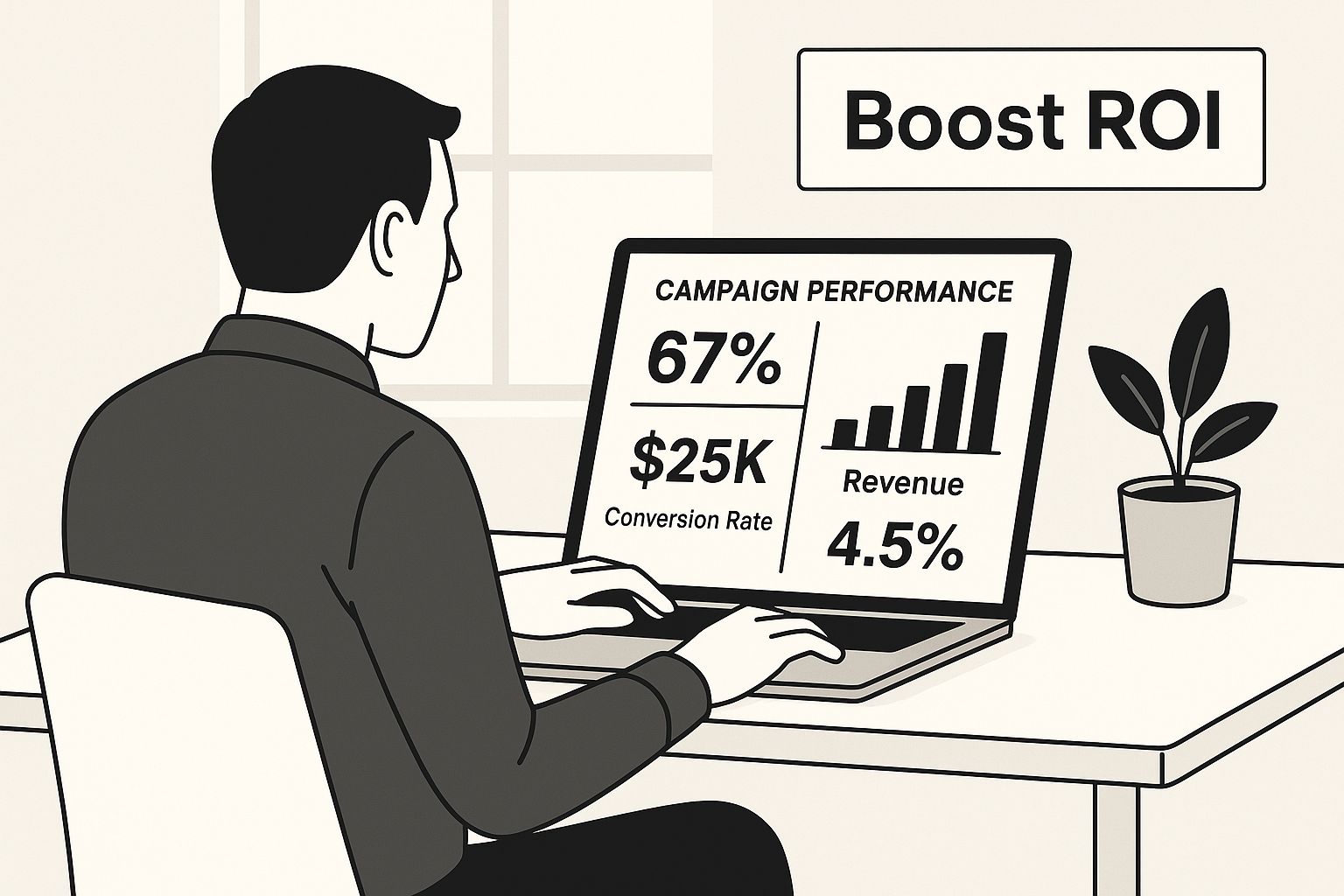
Here's the bottom line: Generative AI takes the analytical insights from ML and the communication skills from NLP to create brand-new marketing assets. We're talking about:
Text: Whipping up entire blog posts, snappy ad copy, and engaging social media updates. Images: Designing one-of-a-kind visuals and ad creative. Video & Audio: Generating scripts, voiceovers, and even short video clips.
Of course, this sparks the debate around AI's creative capabilities. While the tech is impressive, many argue that professional designers and writers still bring an irreplaceable human touch to the table.
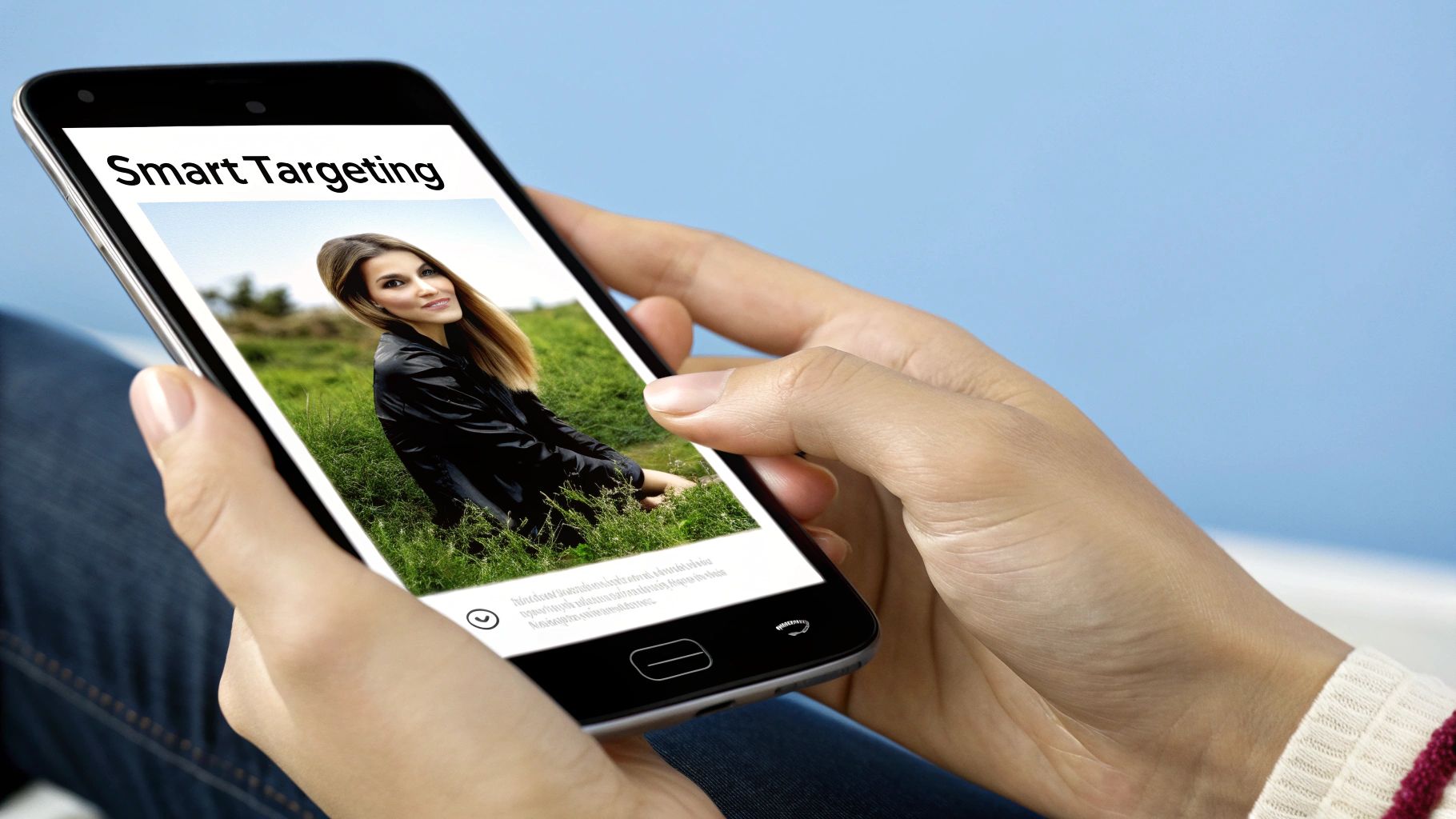
So, what's all the fuss about? Why is every marketer and their dog suddenly obsessed with AI? It’s pretty simple: it delivers jaw-dropping, bottom-line results.
At its core, artificial intelligence in marketing is about taking the chaotic, overwhelming mess of data we all have and turning it into crystal-clear insights. These insights let you create experiences so personal, they feel like they were made for just one person, not a million. It’s all about working smarter, not just harder, and making every marketing dollar you spend work its tail off.
This isn’t just hype. The AI market is already valued at around $391 billion and is expected to balloon nearly fivefold in the next five years. Just look at Netflix—their AI-powered recommendation engine alone is said to generate over $1 billion in revenue every single year. That's the power of getting it right.
AI’s true magic is its ability to connect with customers on a profoundly personal level, but at a massive scale. It’s the difference between shouting into a crowd and having a meaningful, one-on-one conversation with every single person in it.
This shift translates into some seriously game-changing benefits for any marketing team, big or small.
Think of AI as the ultimate marketing sidekick. It gives you a serious competitive edge by cranking up your efficiency, boosting your ROI, and helping you create content that actually lands.
Here’s a look at the good stuff:
Become Wildly More Efficient: AI takes over the tedious, soul-crushing tasks that bog down your creative people. Imagine all the time spent on data analysis, report building, and A/B test monitoring just... gone. Your team is freed up to do what humans do best: think big and strategize.Get More Bang for Your Buck: With smarter ad targeting, AI ensures your budget is spent on the people who are actually likely to buy. By leveraging marketing automation APIs, you can fine-tune your campaigns to a degree that was once impossible, making your ROI look a whole lot healthier.Create Content That Clicks: AI tools can analyze mountains of performance data to tell you exactly what kind of content makes your audience tick. This means no more guessing games. You get a data-backed recipe for more effective social media posts, blog articles, and video scripts, which is key to nailing your social media engagement strategies.
Alright, let's move past the theory and dive into how artificial intelligence in marketing actually works in the real world. This isn't some far-off, sci-fi concept; it's happening right now, helping businesses of all sizes get incredible results.
Ever wonder how your Spotify "Discover Weekly" playlist is so creepily accurate? It feels like your best friend made you a mixtape, right? That’s AI at its finest. The platform is constantly learning from what you play, what you skip, and what you save, then it cross-references your taste with millions of others. The result is a playlist you'll probably love, a perfect example of hyper-personalization that works on a massive scale. To see just how deep this rabbit hole goes, you can explore our guide on the best AI music generators.
This same magic isn't just for music. In the B2B space, companies are using AI to score leads. Imagine an AI sifting through thousands of potential customers, analyzing their every move—website visits, email opens, content downloads—to flag who's ready to buy. This gives sales teams a laser-focused list of hot prospects, so they stop wasting time on dead ends.
And then there's the elephant in the room: content creation. We all know that consistently pumping out high-quality, SEO-friendly content is a beast. Well, AI is here to help tame it.
Tools like SendFame, pictured above, are changing the game. They offer a whole suite of AI-powered features that can whip up everything from blog articles and social media updates to scripts for videos, all in a tiny fraction of the time it would take a human. This doesn't put marketers out of a job; it frees them from the grind, letting them focus on grand strategy and creative thinking.
AI marketing isn't about replacing marketers; it's about giving them superpowers. It automates the tedious, analyzes the complex, and gives you a clear path to what's possible, right now.
To give you a better idea of the landscape, here's a quick look at some common AI tool categories and what they do.
| Tool Category | Primary Use Case | Example Tool |
|---|---|---|
| Content Generation | Creating articles, social posts, and ad copy quickly | Jasper |
| SEO Optimization | Analyzing keywords and optimizing content for search | SurferSEO |
| Email Marketing | Writing subject lines and personalizing email campaigns | Seventh Sense |
| Customer Service | Powering chatbots for instant support | Intercom |
| Analytics & Insights | Identifying trends and patterns in customer data | Google Analytics 4 |
These examples are just the tip of the iceberg. They show that AI is much more than a buzzword—it’s a practical toolkit helping companies connect with their customers on a whole new level.
If you think today’s AI is impressive, just wait. We're on the fast track from simple task automation to full-blown hyper-automation, where AI systems don't just help with tasks—they manage entire campaign workflows.
Picture this: an AI strategist that not only spits out a first draft but then runs its own A/B tests, shifts your ad budget in real-time for maximum impact, and even writes up the final performance report without you lifting a finger. This isn't science fiction; it's the direction we're heading. It frees you up to focus purely on big-picture creativity and brand strategy.
The shift is happening at a dizzying pace. The AI marketing space was valued at a cool $12.05 billion back in 2020. By 2028? It's expected to rocket to $107.5 billion. You can dig into more of these mind-boggling numbers in these AI marketing statistics from SEO.com.
Looking even further down the road, AI is set to become the master architect of brand experiences in new digital playgrounds like the metaverse. Imagine AI building personalized virtual worlds and interactions on the fly. The creative potential is staggering, and you can get a taste of it now by playing with the many AI content creation tools already on the market.
Of course, with great power comes great responsibility. This powerful future is hitched to some serious considerations, especially around ethical AI and data privacy. These conversations are only going to get louder, and frankly, they should.
As AI's capabilities grow, so does our responsibility to use it wisely. The future isn't about letting machines run the show; it's about marketers steering them with ethical purpose and creative insight.
In this new era, building and keeping consumer trust will become the single most important metric. Marketers will have to become guardians of transparency, being crystal clear about how and why customer data is being used. This isn't some far-off fantasy—it's the essential playbook for anyone who wants to succeed in the automated, intelligent years ahead.
As AI keeps popping up everywhere, it’s only natural for questions to bubble up too. Let's tackle some of the most common things marketers wonder about when they think about dipping their toes into the AI waters.
Good news: you absolutely do not need a Ph.D. in data science to make this work. Most of today's AI marketing tools are designed for regular people, not rocket scientists, with user-friendly dashboards you can figure out pretty quickly.
Honestly, the most important skills are the ones you're probably already using. It boils down to thinking strategically about your goals, being creative enough to see how AI-generated ideas can be applied in cool ways, and having a bit of analytical curiosity. You just need to be willing to look at the data and ask, "Okay, but why did that work?" A solid grasp of digital marketing fundamentals is your real ticket to entry.
Ah, the classic question. It's a big point of confusion, but here’s a simple way to think about it: automation follows the rules you give it, while AI learns and then makes its own rules.
Marketing automation is like setting up a perfect line of dominoes. You give it a command: "IF a user signs up for my newsletter, THEN send them this specific welcome email." It’s a fantastic time-saver because it executes the exact tasks you’ve laid out, every single time.
AI, on the other hand, is like a grandmaster who figures out the best possible way to arrange those dominoes on the fly. It might sift through thousands of customer data points and decide, "Folks with this profile are most likely to convert if we hit them with a special discount code at 7 PM on a Tuesday." Automation is the reliable soldier following your orders; AI is the strategist making the decisions.
My best advice? Start small. Focus on one area where you can get a quick, meaningful win. Trying to bring AI into every single part of your marketing at once is a recipe for a headache. This way, you can get a feel for the tech and see some real results without feeling overwhelmed.
A great place to start is with your content. You can find some fantastic AI tools for content creation that help you brainstorm ideas, draft blog posts, or whip up social media captions in a fraction of the time. Many email marketing platforms also have easy-to-use AI features, like subject line generators, which are a perfect, low-stakes entry point.
Here are a few simple starting points:
Content Sidekicks: Use an AI writer to get you past that blank-page paralysis or generate a dozen social media hooks in seconds. Built-in Features: Poke around in the tools you already pay for, like your CRM or even Google Analytics. You might be surprised by the AI features hiding in plain sight. Website Chatbots: Set up a simple AI chatbot to answer the top 5-10 questions you get from customers all day long.
By conquering one small area at a time, you’ll build the momentum and confidence to tackle bigger and more exciting AI projects down the road.
Ready to put AI to work for your creative projects? With SendFame, you can generate custom celebrity videos, original music, and stunning visuals in seconds. Unleash your creativity and try SendFame today!
Create Epic
SendFame